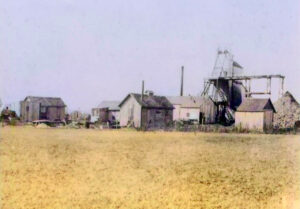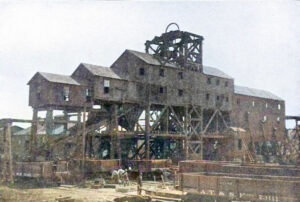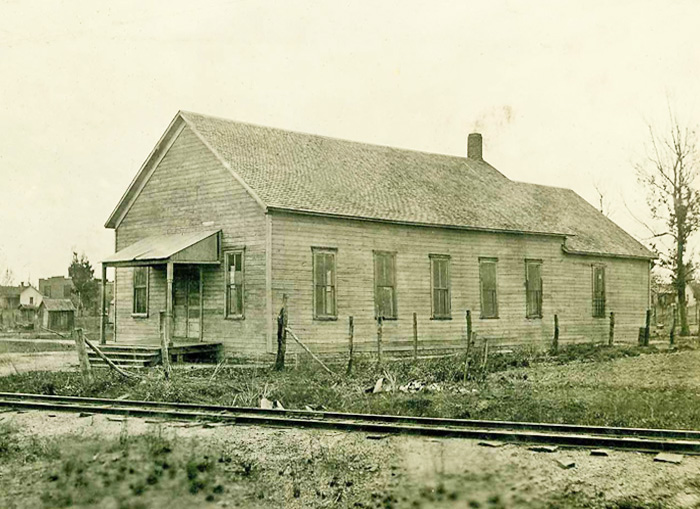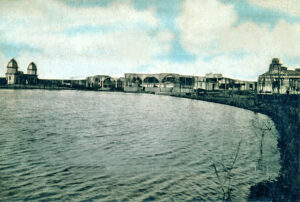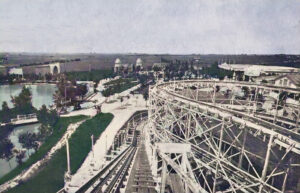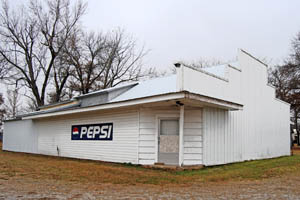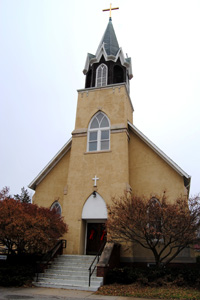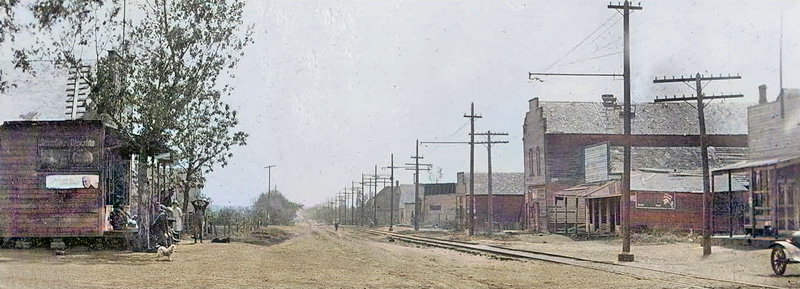
Early day Chicopee, Kansas.
Chicopee, Kansas, is a small town in Baker Township of Crawford County that began as a coal mining community. As it no longer has a post office, it is officially an extinct town. As of the 2020 census, the population was 422.
John Kilholland and the Cherokee & Pittsburg Coal & Mining Company founded the town, and mine No. 4 was sunk there. The community was first called Vermillion after the family that owned the land. It was later changed to Chicopee.
The Atchison, Topeka, and Santa Fe Railway was built to the new camp from Pittsburg, Kansas, which was its terminus. Passenger trains from Pittsburg ran to Chicopee to carry the miners.
In 1880, the Mount Carmel Coal Company began mining operations in Crawford County.
The coal from the Santa Fe mines furnished power for the Santa Fe system’s trains, and much of the coal was shipped into the general market. The Santa Fe Railroad advertised in many countries, and soon, flocks of immigrants came to work and settle in the area.
A post office was established in Chicopee on June 10, 1889.
Charles J. Devlin, the previous manager of the Santa Fe Railroad’s coal department, organized the Mount Carmel Coal Company in 1897. Exploiting mines from Illinois to New Mexico, Devlin hired Joseph Fletcher as the mining superintendent of the new company’s mines in Crawford County, Kansas, located at Frontenac and Chicopee. The company also had coal interests in Osage County.
By 1898, the Santa Fe Railroad leased its entire coal-mining property in Kansas to the Mount Carmel Coal Mining Company of Topeka, Kansas. Mount Carmel Coal Company’s mine No. 5 was located in Chicopee and was connected to the Santa Fe railway. That year, an explosion occurred in the Mount Carmel Coal Mine in Chicopee, killing three and calling for the rescue of five others. The gas generated from the detonation of two windy shots caused the explosion. The last miner rescued, James Zimmerman, was found alive after a 15-hour entrapment. The other miners rescued alive included Ben Shirard, Robert Boyd, Joe Zeitter, and John Tavernaro.
However, the Mount Carmel Coal Mining Company continued to prosper and soon opened up nine mines in this county, six at Frontenac and three at Chicopee.
Passenger train service to Chicopee was maintained until the electric railway was built in the early 1900s. However, the Missouri Pacific and Santa Fe Railroads continued to pass through. Several stores, a post office, boarding houses, and other conveniences accommodated the people. Most of the inhabitants were of foreign birth, and the Italian race was predominant. The people are nearly all coal miners and work for several coal companies operating in Chicopee.
The Mount Carmel Company continued operations in the area until it was adjudicated bankrupt. in July 1905.
In 1907, the Idlehour Amusement Park was established along the community’s northwest border.
In 1914, the Idlehour Amusement Park closed, and its equipment was removed. It was located near the Crestwood Country Club.
In 1910, Chicopee was described as one of the principal towns of Crawford County, with the chief occupation of the people being mining and shipping coal. The Atchison, Topeka & Santa Fe, and Missouri Pacific railroads furnished excellent transportation facilities. At that time, the town had a money order post office, telegraph and telephone facilities, Catholic and Protestant churches, good public schools, some well-stocked stores, and a population of 955.
Chicopee’s post office closed on March 30, 1918.
In 1923, Chicopee was described as a small mining community with one school, one church, electric lights, and a population of approximately 400.
Today, Chicopee is comprised of many homes and a couple of old business buildings. Its old Catholic Church now serves as a community center. The community is served by the Pittsburg Unified School District 250.
Chicopee is 13 miles southeast of Girard, the county seat, and four miles southwest of Pittsburg at the intersection of the county roads South 200th Street and East 530th Avenue.
©Kathy Alexander/Legends of America, updated April 2025.
Also See:
Extinct Towns in Crawford County
Sources:
Blackmar, Frank W.; Kansas: A Cyclopedia of State History, Vol I; Standard Publishing Company, Chicago, IL 1912.
Pittsburg Memories
A Twentieth Century History and Biographical Record of Crawford County, KS, Home Authors, 1905 by Lewis Publishing Company, Chicago, IL
U.S. Mine Disasters
Wikipedia

